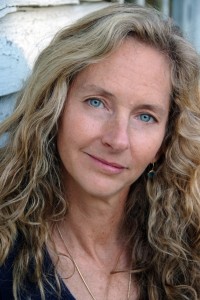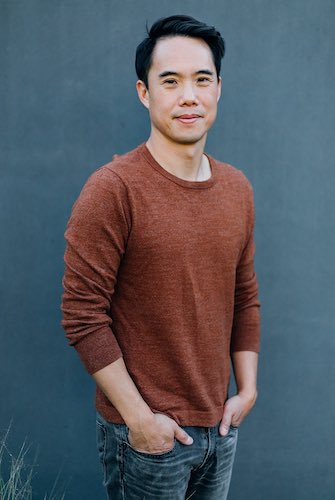In 2005, I was in my first year as a reporter at the York Country Coast Star, a weekly newspaper in Southern Maine with a circulation of 10,000. I covered the towns of Kennebunk and Kennebunkport, and sat through seemingly endless selectmen, planning board, and school board meetings. I covered local spelling bees, murders, and everything in between. Everyday felt like I was being paid (albeit modestly!) for a priceless education in small town politics, interviewing techniques, and the art of reportage.
I was also blessed with two editors who indulged me as I pitched to write more literary pieces for the newspaper.
That first year, I was assigned to write a piece about the anthology Contemporary Maine Fiction (Down East Books, 2005), edited by revered Maine poet and editor Wesley McNair. That’s when I discovered the writing of Lily King.
In an anthology that included authors such as Carolyn Chute, Richard Ford, Stephen King, Lewis Robinson, Richard Russo, and Monica Wood, King’s story “Five Tuesday’s in Winter” stood out as a beacon of tenderness and sincerity. First published in the literary journal Ploughshares, King’s portrait of a divorced father and his precocious daughter was wrought with both difficulty and optimism while remaining utterly authentic. I was hooked.
After I finished “Five Tuesday’s in Winter,” I devoured King’s first novel, The Pleasing Hour (Atlantic Monthly Press, 1999), wherein a young woman flees her life in Vermont to be an au pair in Paris; the novel went on to win the Barnes & Noble Discover Award and become a New York Times Notable Book of the Year.
After that, I went directly to King’s The English Teacher (Atlantic Monthly Press, 2005), which takes place in the classrooms and homes of a small island community in the northeast. The English Teacher eventually landed on the Chicago Tribune’s Best book of the Year list, as well as Publishers Weekly’s Top Ten Best Novels of the Year.
In both novels, with an apparent ease and an unquestionable combination of skill and compassionate insight, King lovingly rendered families in all their foibles and small victories. Both novels opened the heart in unexpected but welcome ways.
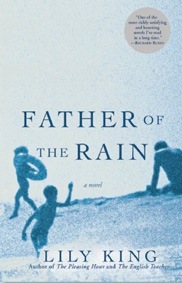 This past summer, King published her third novel, Father of the Rain (Atlantic Monthly Press, 2010). Set in an upper-middle-class East Coast suburb, the book traces a difficult and unpredictable father-daughter relationship from the 1970s to the present day. With her characteristic precision and empathy, King tells the complex story of Daley Amory’s life-long, primal loyalty to her charming and manipulative father. Since its publication, Father of the Rain has appeared on coveted lists from coast-to-coast: the New York Times named it an “Editor’s Pick”; O Magazine put it on their “2010 Summer Reading” list; Publisher Weekly named it a “Best Book of 2010”; and it was awarded the New England Book Award for Fiction.
This past summer, King published her third novel, Father of the Rain (Atlantic Monthly Press, 2010). Set in an upper-middle-class East Coast suburb, the book traces a difficult and unpredictable father-daughter relationship from the 1970s to the present day. With her characteristic precision and empathy, King tells the complex story of Daley Amory’s life-long, primal loyalty to her charming and manipulative father. Since its publication, Father of the Rain has appeared on coveted lists from coast-to-coast: the New York Times named it an “Editor’s Pick”; O Magazine put it on their “2010 Summer Reading” list; Publisher Weekly named it a “Best Book of 2010”; and it was awarded the New England Book Award for Fiction.
King grew up in the East Coast suburb of Manchester, Massachusetts (oddly, in 1990, the town re-dubbed itself with the somewhat precious name Manchester-by-the-Sea) and has acknowledged that Father of the Rain begins with a strong autobiographical note between herself and the novel’s heroine, but after that, fact and fiction quickly part ways.
“In the end, Daley’s life looks nothing like mine,” King regularly tells audience members eager to assume the novel is autobiography. “It starts like this,” she says, placing her palms flat together. “And then it quickly goes like this,” she continues, moving her hands apart in an outward V motion.
“I really am not her,” says King of her heroine. ”But I really understand her.”
That “understanding” has led King to produce a novel that is dark, tender, funny, excruciating, honest, complex, concise, and big-hearted.
[Editor’s Note: The following interview with King was conducted via email and phone in the days leading up to the release of Father of the Rain. A version also appears on the author’s website and on BookBrowse. It is published here in expanded form with the permission of contributing editor Joshua Bodwell.]
Interview:
Joshua Bodwell: What was the first book you remember reading as an adolescent that made a lasting impression on you?
Lily King: In ninth or tenth grade I was assigned Winesburg, Ohio in English class and I fell deeply in love with the language and just the utter bizarreness of the characters’ behaviors, all their secrets and thwarted passions. I remember having to write a paper on the “grotesque” in Winesburg, Ohio. And at the heart was George Willard, a writer struggling to break free from all these people in pain. I wouldn’t have been able to identify with him at the time, but now I understand why I was so drawn to it. I read it over and over in high school.
When did you first start writing and what do you remember of that time?
One of my best friends in fifth grade, Amy Mix, told me one day that she was writing a novel. We had never had one creative writing assignment, ever, so the idea was a shock to me. I started my own novel that night. I only wrote twenty pages, and it had perhaps too many parallels to the Partridge Family (five kids, a painted bus), but it definitely lit the fuse for me. The funny thing is, years later, after college, I talked to Amy Mix on the phone, the first time I’d talked to her since eighth grade, and the first thing I asked her was if she was still writing. “Writing?” she asked, completely bewildered. I’d always assumed she’d become a writer, too.
When you began your new novel, Father of the Rain, what was the initial idea or image that got the story rolling?
I think it started with the puppy, a father buying his daughter a puppy that she wouldn’t be able to keep because she knew, though he didn’t, that she would be moving out of the house with her mother in a week. And her choice of the ugliest puppy, so that it wouldn’t be even harder to leave. Once I got the puppy in the car, the rest of the first chapter came quickly: the mother with the group of city kids in the pool, the father scheming to sabotage the moment in some way, and the daughter trying to please them both at the same time, all the while carrying around this tremendous secret that her mother was about to leave the marriage.
Are you an extensive plotter or did this novel evolve organically as you wrote?
I plot a little ahead. I write with a pencil in a lined notebook and in the back of every notebook I leave twenty blank pages for notes. So while I’m writing chapter one, I’ll get ideas for chapter three and I’ll take a few notes. And then when I have too many notes to see at once, I’ll make a little time line. And sometimes I’ll follow the timeline, and sometimes I’ll toss it out and go in a different direction. I don’t like to be too confined to and restricted by an outline. It can deaden the writing. But I do like a little hint of direction, something to be moving toward.
This makes me think of great E.L. Doctorow line: “Writing is like driving at night in the fog. You can only see as far as your headlights, but you can make the whole trip that way.”
I can’t believe you quoted that of all quotes. It has been my mantra for years and years. Actually, I misquoted it for years and years. Until recently I thought it was “driving cross-country at night.” Not sure where I got that, but writing a novel to me does feel like driving from Boston to L.A. in the pitch black.
It’s so common for readers to believe that novelists pull material from their own lives. You’ve published three novels that feature three complex female characters (two of them written in the first-person). Can you talk about how much material you harvested from personal experience for Father of the Rain and how much is pure fiction?
My mother recently quoted Padgett Powell as saying: “I take everything I know, then lie about it.” I have searched the Internet and can’t find this line anywhere, but I think it sums up the process pretty well. For me writing is like dreaming, elements from life come in but they are jumbled and distorted. It’s the fictional possibilities that light everything on fire for me. When I try to write straight memoir, it feels dead. The only thing that’s still alive is the emotion. So all my novels have a lot of emotional truth, emotions, but not necessarily situations, I have experienced, and in entirely different contexts. Though Father of the Rain begins in autobiographical territory for me—summer of 1974, small town Massachusetts, parents divorcing—it departs from my actual experiences pretty quickly, and by the end of the novel the trajectory that the narrator Daley’s life has taken is very different from mine.
If one were forced to name a common thread between your three very different novels, they might point out your exploration of family. Why do you think that is?
I have a hard time staying away from the family drama. Whenever I write anything, even a short story that is not intended to be about family, a sibling or a parent always walks through the door.
Daley, the narrator of Father of the Rain, is not an only child even though at times it seems she is, and is usually much more emotionally mature than her older brother, Garvey. Why did you decide to not make Daley an only child?
It wasn’t a decision, exactly. Garvey came in during the first chapter, but very faintly, very much in the background, but his presence became increasingly important to Daley and the book. I was really surprised myself by how vital he becomes by the end.
As you follow Daley’s life, you make three significant time leaps in this novel in order to move her from adolescence to middle age. Can you talk about the way you crafted those sections, and also how you maintained Daley’s voice and personality?
I love big leaps in time in novels. But I also know they can be disastrous to its cohesion. I really tried hard not think of how badly it could go wrong and just tried to write from instinct without any sort of intellectualization of it. I didn’t think about trying to maintain anything. I just wrote it the way I felt—not thought—Daley would be thinking in those different circumstances and stages of her life.
The father in Father of the Rain, Gardiner, does many despicable things in the course of this novel—be it reading letters aloud from Penthouse magazine to his children, or the mix of mental and physical violence he commits on those around him—yet he never devolves into a caricature. How did you go about forming this character? Did you have to find a way to empathize with him in order to write him?
He was just there for me. I wasn’t at all aware that I had empathized with him until my husband, my first reader, read it and found him endearing. It really shocked me. Endearing? I knew I was trying to depict as thoroughly as possible Daley’s complicated feelings for her father, but I didn’t realize that the reader would end up with those complicated feelings for him, too.
Do you think this reaction has anything to do with the complexity of alcoholism as an illness, not a choice?
Well, one of the things I’ve learned about alcoholism is that an active drinker who wants to keep his life as together as he can needs to be awfully charming and lovable in order for the people around him to tolerate the drinking.
In The English Teacher you explored a complex mother/son relationship. With Father of the Rain, you have turned your attention to a father/daughter relationship. What caused you to turn your attention to father/daughter?
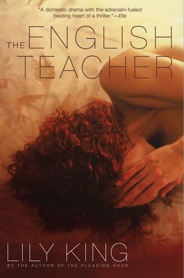 I guess I wasn’t quite done with all the bad parenting possibilities! I am very interested in father/daughter relationships, and I don’t think they get equal play in fiction. There are certainly a great many mother/daughter and father/son novels out there, and a good many mother/son ones, too. But not many father/daughter ones come to mind. Several years ago, I read a parenting book that claimed, with all sorts of studies to back up this claim, that women get their self-esteem almost solely through their relationship with their father. Given that our society, and our world, is still quite patriarchal, it makes sense that a man’s opinion of you is what is going to matter more. Just a few days ago I found one of the first notes to myself that I ever wrote about this novel. There were possible scene ideas, and then at the bottom it said: “The way we were treated by our father is the way we expect the world to treat us.” Father of the Rain is one woman’s efforts to escape that fate.
I guess I wasn’t quite done with all the bad parenting possibilities! I am very interested in father/daughter relationships, and I don’t think they get equal play in fiction. There are certainly a great many mother/daughter and father/son novels out there, and a good many mother/son ones, too. But not many father/daughter ones come to mind. Several years ago, I read a parenting book that claimed, with all sorts of studies to back up this claim, that women get their self-esteem almost solely through their relationship with their father. Given that our society, and our world, is still quite patriarchal, it makes sense that a man’s opinion of you is what is going to matter more. Just a few days ago I found one of the first notes to myself that I ever wrote about this novel. There were possible scene ideas, and then at the bottom it said: “The way we were treated by our father is the way we expect the world to treat us.” Father of the Rain is one woman’s efforts to escape that fate.
You once told me that this novel came in fits and starts, but when it came, “it came in a torrent.” Can you talk about that?
My first two novels came out at a fairly steady trickle, but this one was really erratic. I remember one month in particular, January of 2008. I wrote between three and six pages every day, which is a lot for me. It felt like it was pouring out of me. Then I woke up on the first of February and nothing. I had a sudden visceral aversion to my own novel. I couldn’t go near it. I wrote short stories instead. I didn’t write another word until May. There were a number of times like that. I think I got very sad writing parts of the book, and I’d have to stop so that I wouldn’t be swallowed up by that sadness.
What are your writing habits usually like?
Very routine. I write while my kids are at school. Every weekday. I take weekends entirely off.
Where do you write?
On the third floor of our house. And when I am feeling like I have spent too much time alone, at the coffee shop down the street.
How do you write: with a computer or by hand?
I write my novels in a lined notebook, just like I did in high school when I took my first creative writing class and had to hand in a handwritten three and a half page story every Monday, then I eventually transcribe it all onto a computer. I love that moment of putting chapters on the screen. It’s a crucial editing step for me.
What do you think it is that happens in those moments of transcribing?
I hear it differently. I am a step removed and have put on my editing cap, which is very different from my creating cap. The editor needs stay outside the room for the blank page stage.
Changing directions here, you don’t shy away from sex in your novels. You handle it quite frankly. The sex, and sexuality, in Father of the Rain is (for the most part) particularly jarring. Can you talk a little about that?
Huh. I don’t like books that shy away from sex, nor do I like books that fetishize it. I think it’s really important to know about the sex lives of the characters you’re reading about. It says so much about them. In the case of the father in Father of the Rain, his relationship to sex exposes, very quickly, his arrested emotional development.
Your novels have involved no shortage of difficult subject matters: giving up the child of an unplanned teenage pregnancy, rape, and alcoholism. When asked about the difficult subject matter of his writing, the short story writer Andre Dubus once said, “I think honest writers write about what bothers them.” Do you agree?
What a great quote. I think it’s very true. And so often what bothers you is stuff you really don’t want to write about. But it comes in. It walks into your novel and you scream “No!” and tell those ideas to get out, but they don’t listen.
Who are some of the writers who have influenced you?
It begins with Judy Blume, then Anderson and Updike and Bellow, then Faulkner and Carver, then Virginia Woolf and Toni Morrison, then Marilyn Robinson, Alice Munro, Shirley Hazzard, Alice McDermott, and Rachel Cusk.
Can you take one of those writers and talk specifically about how their work has impacted you, and therefore your work?
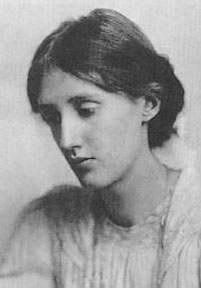
Virginia Woolf
I suppose Virginia Woolf has had the greatest impact on me. I discovered her late, in graduate school, and because of her and because of the work of my best friend there at school, Laura McNeal, who is a stunning writer, my writing took a dramatic turn. I had come to grad school writing sort of pithy, dialogue-driven short stories with very little attention to imagery or the beauty of sentences, but by the end of my two years there, I found I was much more interested in creating mood and texture, a sort of sensual experience. My first novel very much reflects that shift. While I was writing Father of the Rain I was aware of moving away from the lyrical sentence and found my writing was much more driven by dialogue again. I felt like I was leaving Woolf’s influence and it made me feel sort of panicky, like where was I going if not in her direction anymore? I’d like to believe I am coming more into my own voice, though I am at a loss for how to describe it or exactly who has influenced it. I think the truth is that it’s the material itself that has the most influence on how I tell a story, not whom I have read or what I admire. The voice is organic to the story itself.
How does your reading life affect your writing life?
Reading is essential to my writing. It feeds it. I often take notes while I read, not notes on what I’m reading but on what the reading has sparked in my imagination, which is often entirely unrelated to the words on the page. I got the idea for my second novel while reading an essay by James Wood on Virginia Woolf. I think the note I took was: “novel set during hostage crisis ’79-‘81?” When I am completely depleted, I often take a day or week off of writing and just read to replenish.
Some authors have claimed that they only read nonfiction—or don’t read at all— while they are in the thick of writing a novel because they fear that another writer’s voice will creep into theirs. Do you ever worry about that?
I hear that a lot. But I have to read fiction for inspiration, for a reason to go on. Nonfiction rarely gives me the thrill of fiction. And I don’t feel like my voice is so fixed that it wouldn’t be aided by a dose of great writing every day.
You once told me that given the option between writing and your daughters, you will “choose my children over my writing every time.” Can you talk a little bit about navigating motherhood and authorhood?
Before my children were in school full-time it was a chronic struggle and confused me to no end. I had part-time childcare and was constantly reconfiguring the hours. I never felt like I had enough time to write, and yet I missed my children terribly in the hours that I did have. Then they went to school and the balance was righted.
Have you started to think about what’s next for you as far as writing?
I’m working on a collection of stories and thinking about a novel I already have tons of notes for, which I had planned to write until Father of the Rain leapt in and demanded all my attention.
Do you think stories are created or discovered?
I just read my eleven-year-old daughter this one, and she said, “That’s an amazing question.” I think they are created, but the good ones feel discovered.
Finally, if you could be any fictional character, who would you be?
Elizabeth Bennett. I admire her to no end.
Further links and resources:
- Lily King’s website, lilykingbooks.com, features her appearances, info on her three novels, interviews, and a terrific reading list that includes Halldor Laxness, Rachel Cusk, Anne Enright and Jhumpa Lahiri.
- Read a review of Father of the Rain, written by Wendy Smith of The Chicago Tribune.
- Intrigued by King’s practice of handwriting her first drafts? She’s in good company. On The Mantle, Vicente Garcia Groyon discusses the practice in “The Loneliness of the Longhand Writer.” Others in King’s camp include Michael Ondaatje and Natalie Goldberg.
- Read an excerpt from Father of the Rain and download a Reading Guide for your book club at the Grove/Atlantic site for Lily King.

